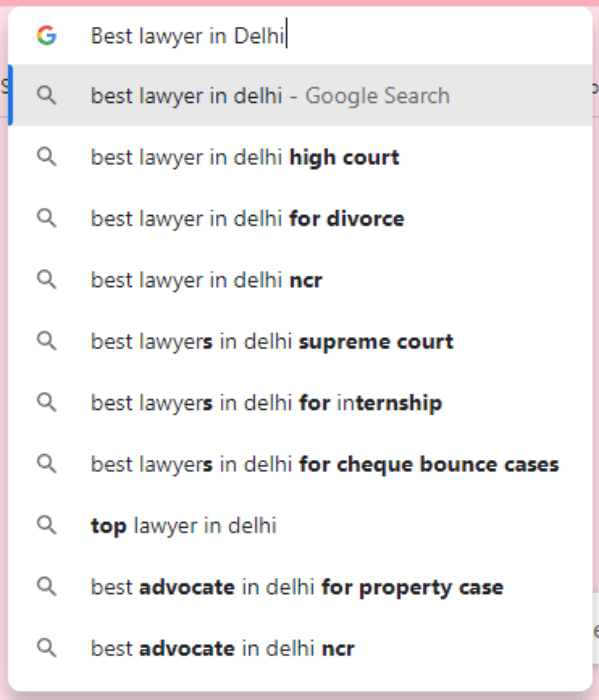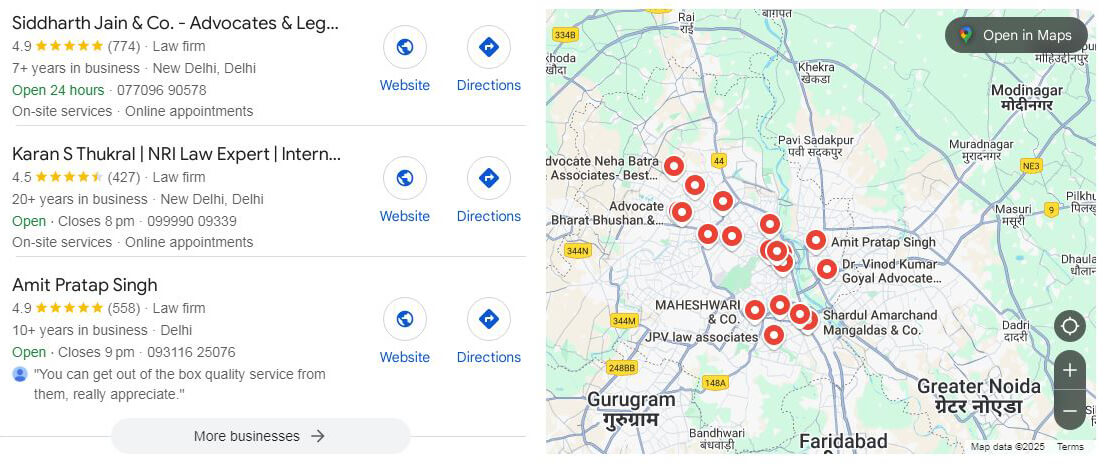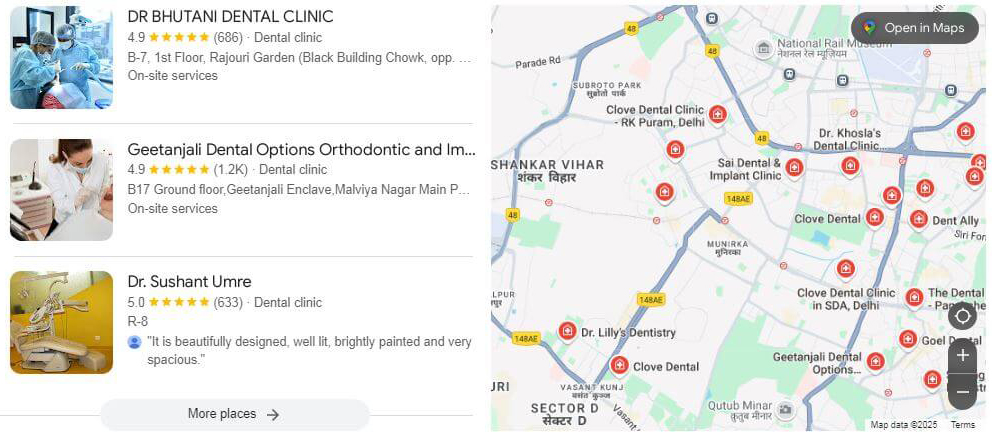In the highly competitive legal industry, having a professional website isn’t enough. Your potential clients are increasingly turning to search engines like Google to find legal assistance. This is where SEO for law firms in India becomes essential. SEO, or Search Engine Optimization, helps your law firm appear higher in search engine results when someone searches for legal services in your area.


What is SEO and Why Does It Matter for Legal Services?
Law firms SEO involves optimizing your website and content to rank for keywords your potential clients are searching for—like “divorce lawyer in Delhi” or “property dispute lawyer near me.” With the right SEO strategy, your firm can:
- Increase online visibility
- Drive targeted traffic to your website
- Generate qualified leads organically
Unlike paid advertising, SEO brings in sustainable, long-term traffic without having to pay for each click.
Changing Client Behavior: Why People Search Online Before Contacting a Lawyer
Today’s clients research legal services extensively before making a decision. They want to compare law firms, read reviews, and learn more about their legal issues. If your law firm doesn’t appear in their search results, you’re missing out on potential clients.
A strong online presence, powered by legal SEO strategies, positions your firm where people are looking—on the first page of Google.
How SEO Builds Long-Term Visibility and Trust for Your Law Practice
High search engine rankings are perceived as a sign of authority. When your website consistently appears for relevant legal queries, it builds trust with potential clients. Over time, SEO:
- Establishes your firm’s credibility
- Reduces dependency on paid ads
- Creates a steady pipeline of inquiries and cases
By investing in SEO for legal services in India, you’re investing in your firm’s long-term digital growth.
Keyword Research for Legal SEO
Importance of Keyword Research for Law Firms in India
SEO for legal firms in India involved keyword research which is the foundation of any successful legal SEO campaign. It involves identifying the terms people use to search for legal help. Targeting the right keywords ensures that your content reaches users who are actively seeking legal assistance.
For example, instead of targeting generic terms like “lawyer,” focus on specific, localized keywords like “civil lawyer in Bangalore.”
Types of Keywords to Target (Practice Area + Location)
Law firms SEO in India should target keywords that combine practice areas with geographic locations. Examples include:
- “Corporate lawyer in Mumbai”
- “Immigration law firm in Delhi”
- “Divorce attorney in Pune”
These geo-specific keywords attract potential clients in your service area and increase your chances of ranking in local search results.
Long-Tail Keywords vs. Broad Terms
Long-tail keywords are longer, more specific search phrases such as “best family lawyer in Chennai for child custody.” These are less competitive and more likely to convert because they reflect clear intent.
Broad keywords like “lawyer” or “legal help” have high competition and may not drive relevant traffic. SEO for law firms in India, a mix of long-tail and short-tail keywords is recommended.
Tools to Find High-Intent Legal Keywords
Here are some popular tools to find high-converting legal keywords:
- Google Keyword Planner
- Ubersuggest
- Ahrefs
- SEMrush
- Google Search Console
Use these tools to uncover:
- Keyword search volume
- User intent
- Competition level
- Related keyword suggestions

On-Page SEO for Law Firm Websites
Title Tags and Meta Descriptions Tailored for Legal Services
Title tags and meta descriptions are essential for improving click-through rates from search results. Make sure to:
- Use practice area + location (e.g., “Divorce Lawyer in Delhi | ABC Law Firm”)
- Keep the title under 60 characters
- Make meta descriptions compelling and informative

Optimizing Header Tags (H1, H2, etc.) with Legal Keywords
Organize your content using clear headers:
- H1: Main title (e.g., “Top Criminal Defense Lawyers in Hyderabad”)
- H2: Subheadings like “Our Services” or “Why Choose Us”
- H3/H4: FAQs or supporting details
Use your primary and secondary keywords naturally in headers for better SEO.
Creating SEO-Friendly URLs for Service and Location Pages
Clean, keyword-rich URLs improve user experience and help with ranking. Examples:
- www.lawfirm.com/family-law/delhi
- www.lawfirm.com/corporate-law/mumbai
Avoid dynamic URLs with symbols or numbers. Use hyphens to separate words.
Writing Unique, Informative Content for Each Practice Area
Each legal service should have its own dedicated page with:
- Detailed explanations of services offered
- Answers to common client questions
- Local references and keywords
Unique content boosts relevance and reduces bounce rates, improving SEO performance.
Including FAQs for Legal Services with Schema Markup
Add a Frequently Asked Questions section to each service page. Use FAQ schema markup to make them eligible for rich results in Google.
Sample questions:
- “What are the grounds for divorce in India?”
- “How much does a criminal lawyer charge in Delhi?”
Schema markup enhances visibility and improves user experience.
Practice Area Pages Optimization
Why Each Legal Practice Area Deserves Its Own Optimized Page
Each area of legal practice targets a different audience with unique concerns. Having a dedicated page for each service helps in:
- Targeting relevant keywords more precisely
- Increasing user engagement with detailed information
- Improving your site’s relevance and rankings on search engines

How to Structure Content for Services Like:
- Criminal Defense: Explain the types of charges you handle, bail processes, and defense strategies. Use keywords like “criminal lawyer in Delhi
- Family Law: Cover divorce, child custody, alimony, etc. Use empathetic language and target phrases like “child custody lawyer in Delhi.”
- Personal Injury: Talk about accident claims, medical negligence, and compensation. Include FAQs and success stories.
- Corporate Law: Focus on business registrations, compliance, contracts, and litigation. Use professional language and terms like “corporate legal advisor in Gurgaon.”
- Immigration Law: Address visa types, appeals, and legal documentation. Use keywords like “immigration attorney in India.”
- Real Estate Law: Cover property disputes, registration, verification, and transactions.
- Employment Law: Explain employee rights, wrongful termination, and labor law consulting.
Include strong calls-to-action and internal links to related articles or FAQs.
Local SEO for Law Firms
Local SEO helps your law firm appear in location-specific search results and Google Maps. Key strategies include:
- Creating and optimizing a Google Business Profile for Low Firms
- Listing your firm on legal directories like JustDial, Sulekha, and LawRato
- Adding NAP (Name, Address, Phone) consistently across the web
- Collecting positive reviews from clients
- Embedding Google Maps on your contact page
Optimizing for “near me” searches like “lawyer near me open now” can bring high-intent traffic.
Content Marketing for Legal SEO
Why Blogging Helps Law Firm SEO
Blogging keeps your website active and helps you rank for informational queries. It’s also a chance to educate and build trust.
Ideas for Valuable Legal Content
- FAQs: Answer client concerns like “How long does a divorce take in India?”
- How-to Guides: “How to file an FIR” or “Steps to register a company in India”
- Case Studies: Share anonymized stories to show expertise
- Legal Updates: Comment on new laws and legal reforms
Writing Content with Legal Authority and Empathy
- Use simple language, avoiding legal jargon
- Show genuine understanding of client concerns
- Support claims with relevant laws or precedents
How Often to Publish Blog Posts
Aim for at least 2-4 posts per month. Consistency is more important than volume. Focus on quality, relevance, and keyword optimization.
Link Building Strategies for Law Firms
Importance of Backlinks in Legal SEO
Backlinks signal trust to search engines. A law firm with quality inbound links is more likely to rank higher.
Strategies to Earn Quality Backlinks
- Local News Sites: Pitch stories or legal opinions to journalists
- Legal Publications: Submit expert columns or insights
- Guest Posts: Contribute to legal blogs and forums
- Sponsorships and Events: Partner with local NGOs or community events for backlinks
Building links ethically and naturally helps boost domain authority over time.

So what are you waiting for the world is out there waiting for your business. Start acting Global!
Technical SEO for Legal Websites
Site Structure and Navigation Optimization
Ensure a logical website hierarchy with clear navigation. Group related pages under appropriate categories (e.g., Practice Areas, About, Contact).
Mobile Responsiveness and Page Speed Optimization
With more people searching from mobile devices, your site must be mobile-friendly. Use tools like Google PageSpeed Insights and ensure quick load times.
Secure Browsing with HTTPS
Having an SSL certificate ensures your site is secure. Google favors secure websites in search rankings.
Setting Up XML Sitemap and Robots.txt
Create an XML sitemap to help search engines crawl and index your site. Use a robots.txt file to guide bots and prevent them from indexing unnecessary pages.
Structured Data and Schema for Lawyers and Law Firms
Implement schema markup for:
- Legal services
- Local business info
- FAQs
This helps search engines understand your content and display rich snippets.
SEO for Multi-Location or Multi-Practice Law Firms
If your firm operates in multiple cities or has many practice areas:
Start a real estate blog with posts like:
- Create separate landing pages for each location and service
- Use localized content and keywords
- Optimize Google Business Profiles for each office
- Avoid duplicate content across similar pages
This strategy helps target clients in different locations more effectively.

































